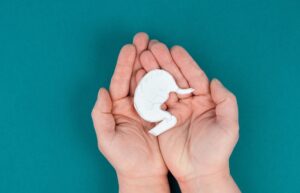
What Are the Lifestyle Factors Causing GERD
Lifestyle Factors Causing GERD include the following
- Dietary Choices: Certain foods can trigger or exacerbate GERD symptoms. This includes spicy foods, acidity-triggering foods, and fatty foods. Caffeine and chocolate are common culprits as well.
- Overeating: Consuming large meals can put excessive pressure on the lower esophageal sphincter, leading to acid reflux.
- Obesity: Excess body weight, particularly around the abdomen, increases the risk of GERD by contributing to the weakening of the lower esophageal sphincter.
- Smoking: Smoking can lead to weakening of the lower esophageal sphincter. This then activates the production of stomach acid. This makes smoking a significant risk factor for GERD.
- Alcohol Consumption: Alcohol relaxes the lower esophageal sphincter and enhances stomach acid production, leading to heightened GERD symptoms.
Recognizing and addressing these lifestyle triggers empowers individuals to proactively manage GERD symptoms and improve their overall well-being.
Can GERD be Prevented?
While it may not be entirely preventable, adopting a proactive approach to one’s lifestyle can significantly reduce the risk of developing GERD. By addressing the root causes and making conscious choices, individuals can create an environment less conducive to acid reflux.
Lifestyle Modifications for GERD Management
- Eat Smaller and More Frequent Meals: Consuming smaller, well-balanced meals throughout the day can prevent excessive stomach distension, reducing the likelihood of acid reflux.
- Do not Overeat: Overeating puts extra pressure on the lower esophageal sphincter, the muscle that separates the stomach from the esophagus. This increased pressure can contribute to acid reflux.
- Drink More Water: Staying hydrated helps in diluting stomach acid, making it less likely to irritate when reflux occurs.
- Wear Loose-Fitting Clothes: Tight clothing, especially around the abdomen, can exacerbate GERD symptoms by increasing pressure on the stomach.
- Quit Smoking: Smoking weakens the lower esophageal sphincter and promotes the production of stomach acid, making it a significant risk factor for GERD.
- Avoid Alcohol: Alcohol can relax the lower esophageal sphincter and increase stomach acid production, leading to heightened GERD symptoms.
- Lose Weight: Excess weight, especially around the abdomen, can contribute to GERD. Losing weight through a combination of diet and exercise can alleviate symptoms.
- Reduce Pressure on Your Stomach: Activities that increase intra-abdominal pressure, such as heavy lifting, can exacerbate GERD symptoms. Avoid such activities when possible.
- Avoid Lying Down For At Least Two Hours After a Meal: This ensures that gravity keeps the stomach acid in the stomach. This helps in reducing the likelihood of reflux.
- Keep your head raised While Sleeping: Elevating the head of the bed or using a wedge pillow can prevent stomach acid from flowing into the esophagus during sleep.
Reversing GERD with Comprehensive Lifestyle Changes:
While adopting a GERD-friendly diet is crucial for symptom alleviation and overall digestive health, it’s important to note that solely relying on dietary adjustments may not entirely reverse GERD. A holistic approach involving various lifestyle changes is essential to effectively manage and improve this condition.
Emphasizing a GERD-friendly diet is certainly beneficial, encouraging the consumption of a diverse range of fruits, vegetables, lean proteins, and whole grains while minimizing intake of spicy, acidic, and fatty foods. However, a comprehensive strategy that includes additional lifestyle modifications is key to achieving lasting relief from GERD symptoms.
Is Fasting Good For GERD?
Fasting, when done mindfully, can be beneficial for GERD management. However, avoiding prolonged periods without food is essential, as an empty stomach can lead to increased stomach acid production and worsen symptoms. Opt for smaller, more frequent meals during fasting periods.
Additional Considerations
- Consulting Healthcare Professionals: Individuals experiencing GERD symptoms should seek medical advice for personalized guidance. Healthcare professionals can tailor recommendations based on the severity of symptoms and individual health conditions.
- Medication Adherence and Lifestyle Changes: Lifestyle modifications complement medication in managing GERD. Adhering to prescribed medications while implementing positive lifestyle changes enhances overall treatment effectiveness.
- Tracking Progress: Regularly monitoring symptoms is crucial for understanding the impact of lifestyle modifications. A diary of dietary choices, activities, and symptoms can help identify triggers and measure progress over time.
Conclusion
In conclusion, lifestyle modifications are integral to the effective management of GERD. By making informed choices regarding diet, physical activity, and other daily habits, individuals can significantly reduce the impact of GERD symptoms, ultimately leading to an improved quality of life. Encouragement is extended to all those affected by GERD to embrace these changes and work towards a healthier, symptom-free future.